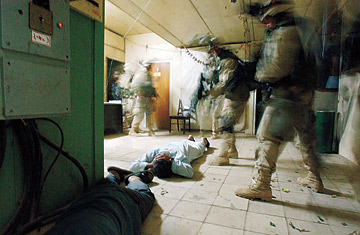
U.S. Army Infantry Rangers detain two Iraqi men inside a government building in Baquba, Iraq, in April 2003
(3 of 3)
When the Bush administration's attention turned to Iraq in late 2002, Rumsfeld and his Army planners clashed anew. At first, Gen. Tommy Franks' war plan sounded like a reprise of the Desert Storm campaign of 1991, calling for a slow buildup of hundreds of thousands of troops in preparation for a large and decisive battle. The plan was a textbook continuation of the so-called Powell Doctrine, named after Colin Powell, the former Army general who was current Secretary of State. The Powell Doctrine held that the U.S. military should not be deployed unless clear risks to the nation's survival were at stake. And when committing troops, the war plans must emphasize overwhelming force, exit strategies, and when possible, broad support from the international community. Rumsfeld thought those policies were outdated, that the world's crises were too messy and too fast-moving and varied for such a rigid structure. Rumsfeld ordered Franks to throw out his Iraq war plan and focus on one that emphasized precision air strikes and small, nimble units that could decapitate the Iraqi regime before Saddam Hussein could even contemplate a counterstrategy. American and British forces ultimately deployed 170,000 troops (a third the number that participated in Desert Storm), and the drive to Baghdad was completed in just 21 days.
Special Forces played a central role in the Iraq campaign even before the war officially began. They slipped into the country, seizing airfields for the invading force and protecting oilfields from potential sabotage. They rolled into dozens of towns looking for arms caches, cleared mines from harbors and rivers, and hunted down top members of Saddam's regime.
There was, of course, at least one crucial flaw in Rumsfeld's ambitious new way of warfare: He made no accommodations for occupation or reconstruction of newly conquered lands. If there is one thing special ops forces adamantly insist they are neither trained nor equipped to do, it is to hold and defend land. Without enough conventional forces to maintain law and order, both Afghanistan and Iraq slipped into states of insurgency and lawlessness — a situation that persists nearly a decade later.
Yet even as Iraq and Afghanistan were morphing into larger, lingering nightmares, the American military's transformation kept going. In 2003, Rumsfeld brought in Gen. Peter Schoomaker, who had been an original member of Delta Force and who had spent most of his career in special ops, to become the Army's Chief of Staff. The first time a Special Forces alumnus had been tapped as head of the entire Army, it was a water-shed moment, as momentous as Stan McChrystal's appointment to a major combat command. Rumsfeld began expanding the special ops budget and role as well. Against some admirals' resistance, for example, he supported the initiative to modify submarines to carry SEAL delivery vehicles in place of Trident nuclear missiles. And in 2004 he announced plans to bring home an additional 70,000 troops from the U.S.'s large Cold War-era bases in Asia and Europe, even as he expanded a network of smaller, more streamlined bases elsewhere around the world to support rotational units rather than permanently garrisoned ones.
During his tenure, Rumsfeld doubled the total special ops budget to $7 billion, and nowhere was the change more dramatic than the invigoration of JSOC. An executive order drawn up by Rumsfeld in 2004 and approved by President Bush identified up to 20 countries, including Syria, Pakistan, Yemen, and Saudi Arabia, that were believed to be harboring al Qaeda, and it gave JSOC broad authority to operate in those countries. With Rumsfeld's blessing, JSOC went from being an organization that merely provided forces to other commanders to a full-fledged war-fighting command, one that could operate independently of other U.S. military jurisdictions virtually anywhere in the world. In the name of fighting global terrorism, JSOC has become, effectively, an armed service unto itself.
Order a copy of Special Ops at time.com/specialops.